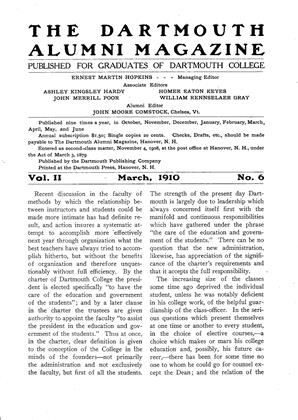Doctor Tucker's book of the above title has just appeared from the Rumford Press of Concord, N. H., and will be of wide interest, especially to Dartmouth men.
The value of the average occasional address is expended when the last word is spoken: its interest dies with the conclusion of the program of which it is a part. For it is the fashion of occasional addresses to concern themselves with the immediate and obvious aspects of an event rather than to consider its relation to the general trend of human affairs; to use an occasion more as a rallying ground for familiar ideas, than as a point of departure into the new and large. But of this easy attitude Doctor Tucker's mind has always been incapable. It has been his gift to perceive wide relations: to interpret the small in terms of the large. To him, then, a public gathering has been in a way, a recognition of public responsibility,—a case for enlightenment, and not for mere congratulation. Hence, though many of the occasions which called them forth are largely forgotten, Doctor Tucker's addresses remain an important contribution to the literature of citizenship. It is fortunate that he has been persuaded to gather them together and allow their publication in permanent form.
To the book thus constituted he has given the title "Public Mindedness" since, in his view, public mindedness is the essential quality of worthy citizenship. The arrangement is not chronological: first are addresses dealing with some of the present requirements of citizenship; then come those dealing with men or with events illustrating in one way or another some aspect of citizenship; in the concluding addresses account is taken of various educational agencies which may be expected to Dear their part in the training of citizens: Impressive a speaker as Doctor Tucker was his words gain a new power on the printed page: for they are packed with thought that inspires reflection and abounds with keen felicities of expression that gain force in leisurely examination. Aside from the clear and lofty ideal that, from from beginning to end, animates its subject matter, the book is interesting as throwing a side light upon Doctor Tucker's general policy as president of Dartmouth, and valuable in providing both in substance and in form the definitive model of serious public address.
 View Full Issue
View Full Issue
More From This Issue
-
 Article
ArticleTHE CRITICAL PERIOD FOR THE AMERICAN COLLEGE
March 1910 By Ernest M. Hopkins '01 -
 Article
ArticleRecent discussion in the faculty of methods
March 1910 -
 Class Notes
Class NotesLOCAL ASSOCIATIONS
March 1910 -
 Article
ArticleBASKETBALL
March 1910 -
 Class Notes
Class NotesCLASS OF 1899
March 1910 By Charles H. Donahue -
 Article
ArticleCOLLEGE NOTES
March 1910








